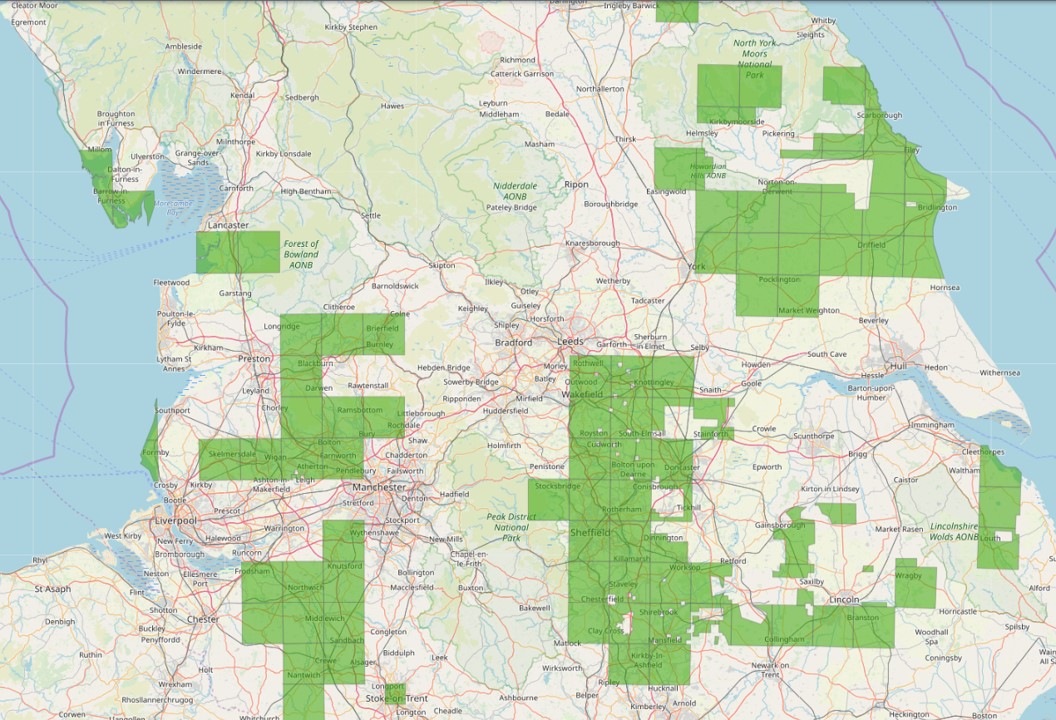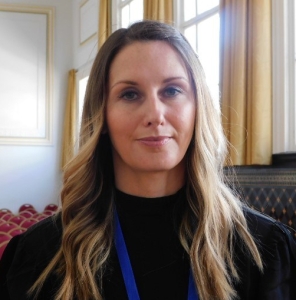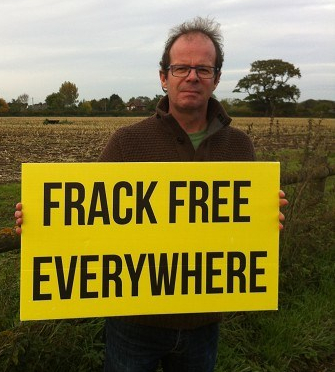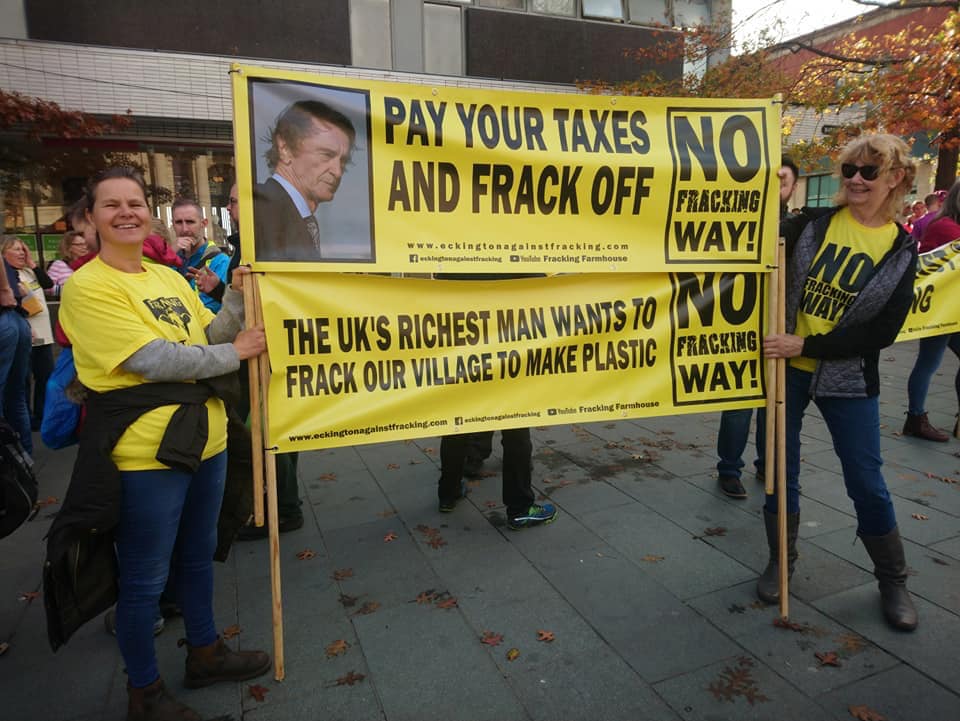
14th round licences offered in central and northern England. Source: Oil & Gas Authority
Time is running out for UK onshore oil and gas companies that were awarded exploration licences in the most recent government licensing round.
They now have fewer than 900 days to complete seismic surveys in 50 licence areas, find well sites, get planning permission and permits, drill a total of 97 wells and frack 12 of them.
Under the 14th round commitments to the government, the companies must complete all this work by 20 July 2021, under two-and-a-half years away.
More than half the exploration, or initial, phase of the licences has now past. But so far, just one company, Ineos Upstream, has carried out seismic surveys across some of its exploration licences, or PEDL areas.
We don’t know how many companies have found potential well sites. But we do know that just one company, Ineos Upstream again, has applied for planning permission to drill at three places: Marsh Lane in Derbyshire, and Harthill and Woodsetts in south Yorkshire.
All these applications were refused by local councillors. Two refusals, at Marsh Lane and Harthill, were overturned on appeal. An appeal against the Woodsetts refusal is expected to be heard at a public inquiry, probably this year.

The village of Marsh Lane from Bramleymoor Lane where Ineos proposes to explore for shale gas. Photo: DrillOrDrop
No work has started at either Marsh Lane or at Harthill and we understand that pre-work planning conditions have yet to be signed off by planners.
None of the other operators of 14th round licences have yet submitted any planning applications.
The work programme promises comprise what are called firm commitment wells. These include vertical and horizontal wells, some of which must be fracked. There are also drill or drop wells, which must be completed for the company to keep the licence.
Work programmes
Here’s a summary of what the companies with the largest number of licences promised the government they would drill and frack by July 2021:
Ineos: 24 PEDL licences
- Drill 19 firm commitment vertical wells
- Drill and frack 11 firm commitment horizontal wells
- Plus 9 Drill or drop wells
Cuadrilla: 8 PEDL licences
- Drill 2 firm commitment vertical wells
- Drill and frack 1 firm commitment horizontal well
- Plus 6 Drill or drop wells
IGas: 7 PEDL licences
- Drill 3 firm commitment vertical wells
- Plus 4 Drill or drop wells
Alkane: 6 PEDL licences
- Drill 3 firm commitment vertical wells
- Plus 3 Drill or drop wells
South Western: 5 PEDL licences
- Drill 2 firm commitment vertical wells
- Plus 3 Drill or drop wells
Cirque: 4 PEDL licences
- 4 drill or drop wells
Hutton: 4 PEDL licences
- Drill 6 firm commitment vertical wells
Egdon: 4 PEDL licences
- Drill 1 firm commitment vertical wells
- Plus 3 Drill or drop wells
Aurora: 3 PEDL licences
- 3 Drill or drop wells
The remaining companies promised to drill another 14 wells between them.
Can they do it and what happens if they don’t?

Lynn Calder,
In July 2017, DrillOrDrop asked Lynn Calder, then commercial director of Ineos Upstream, whether the company’s work programme was achievable.
She said:
“It doesn’t seem very realistic to be quite frank, particularly as it’s a year [since the licences were granted] and we’ve got one planning application in and we know that the planning process is going to be challenging. …
“When you see planning applications taking in excess of three years including judicial reviews, then absolutely it seems like a complete pipe dream to think that we can discharge these obligations in a four year period. Which is why we’re not taking much truck with time-wasting because we really want to say ‘there is a framework in place, there’s a planning system that people can use to air their concerns and we would just really like those to be adhered to’.
“In answer to your question it’s incredibly optimistic that we’ll be able to get through all of those obligations but we will certainly be running as fast as we can.”
18 months on, the 14th round companies would need to drill at an average rate of one well every 10 days to meet their commitments by the deadline.
It may be that operators have delayed their applications in the hope that the government would change the planning rules. It has proposed to treat non-fracking exploration wells as permitted development without the need for local authority consent.
But a consultation on the proposal prompted opposition from Conservative MPs and councillors and ministers were warned they may not have the parliamentary votes to push it through. The Brexit process could well generate more than enough internal opposition for the government to handle, at least in the coming months.
Given this, the recent fracking-induced seismic problems encountered by Cuadrilla and the industry’s recent drilling record (just three wells drilled in 2018), it looks very optimistic that the 14th round work commitments will be delivered on time.
 Researcher and anti-fracking campaigner, Ben Dean, said:
Researcher and anti-fracking campaigner, Ben Dean, said:
“It is clear the industry and the Oil & Gas Authority (OGA) fully expected that virtually all of the 14th round PEDLs would fail to complete their contracted work commitments in the initial five year term.”
Under the regulations, operators can lose their licence if they fail to comply with the work programme. But recently the OGA has been much more likely to extend the initial term than cancel the licence.
Mr Dean said:
“It looks likely that almost all of the 70+ licenses will require time extensions to their Initial Term.”
He questioned whether the regulations were promoting onshore production effectively.
“Frankly, are these licenses/contracts fit for purpose and would parliament have passed the legislation it has, if it had the foresight to have known how ineffective its legislation would be in bringing forward an onshore hydrocarbon industry?”
DrillOrDrop asked the OGA whether it expected the operators to meet their work commitments and what would happen if they didn’t. The OGA replied: “Yes”.
A spokesperson for the organisation added:
“If, during the course of the initial phase the licensees request changes to the work programme, the OGA will consider these and, provided that it would not be inconsistent with the statutory scheme or EU law to do so, may agree to vary the programme or its duration.”
Does it matter?
So, the 14th round companies could get extra time to drill and frack their wells or they could seek to change their work programmes. But would this put them in breach of financial regulations? Researcher Ben Dean thinks that it might.
Companies bidding for PEDLs in the 14th round entered an open tendering process. This was guided by the Hydrocarbons Directive Regulations 1995.
The bidding companies were assisted by Technical Guidance. This explained that the decision to award a licence would be based largely on the work programme proposed by the company.
The work programme would be assessed against a marks scheme. The more work proposed, the higher the mark. Firm commitment wells were worth more points than drill or drop wells and fracked wells were worth more than exploration drilling. Bidders with ambitious work programmes were more likely to be awarded licences.
Ben Dean said:
“Any changes that significantly reduced a PEDL operators’ work commitments could potentially prejudice the unsuccessful bidders in the 14th round.
“The successful operator could end up with a reduced work programme that was the same, or smaller, than the unsuccessful bidder.”
A Freedom of Information request, by Mr Dean, revealed that up to January 2019, there had been three applications to the OGA to change the initial term work commitments.
After an internal review, the OGA released more details. All the applications were to extend the time limit during which the drill or drop wells could be drilled, from two years (now passed) to the end of the initial phase of the licence.
The applications were by:
- IGas, PEDL257, Surrey
- Reach Coal Seam Gas Ltd, PEDL260, Barrow-in-Furness, Cumbria
- Egdon Resources, PEDL339, Louth, Lincolnshire
In each case, the OGA “exercised its discretion” and extended the period for the drill or drop wells.
DrillOrDrop asked whether a failure to comply with work commitments by the end of the initial phase would be considered a breach of the tendering regulations.
The OGA replied:
“The licence may be revoked if the work programme has not been completed unless programme variations have been agreed.”
Ineos challenges

Based on the published 14th round work programmes, Ineos faces by far and away the biggest challenge to meet its work commitments.
With under a third of the total 14th round licences, Ineos must deliver just over half the total firm commitment vertical wells, 91% (all but one) of the fracked horizontal wells and 19% of the drill or drop wells.
The company also faces organised opposition in some of its licence areas.
In PEDL294, which covers Frodsham, Sandiway and Northwich, in Cheshire, Ineos has committed to drill two wells to depths of 4,5000m, each with a lateral to be hydraulically-fracked.
Ineos has also committed to frack in PEDLs 289 and 332 (East Yorkshire), 292 (Cheshire), 300 (Derbyshire), 304 (south Yorkshire), 307 and 308 (Nottinghamshire).
The company was quoted widely in the media in November 2014 about plans to invest up to $1bn or £640m in UK shale gas exploration. At the time, it referred to drilling “hundreds of wells” across Scotland and northern England.
Mike Amesbury, the Labour MP, whose Weaver Vale constituency covers PEDL294, said:
“First and foremost I’m opposed to fracking under any circumstances, and I find the idea of drilling deep holes of almost four and a half kilometres into the beautiful Cheshire countryside, frankly quite horrifying.
“We’ve heard comments from the industry in recent months along the lines of how current planning issues are holding them up, or how earth tremor regulations are ‘getting in the way’ of their progress.
“But those rules are there for a reason.
“It’s a regressive industry and we should focus on renewables rather than fossil fuels.”
Ben Dean estimates that Ineos would need to spend more than the £640m public commitment to meet its 14th round work programme. On drilling in PEDL294, he said:
“These are vertical wells about 1,000m deeper than Cuadrilla has drilled at Preston New Road (PNR), near Blackpool.
“The geology of north Cheshire is very complex and similarly heavily faulted, as at PNR. It is estimated that PNR has cost Cuadrilla and its investors over £100M to date. It is difficult to comprehend why, or how Ineos, has committed to an exploratory initial term cost commitment of around £150M in PEDL294.
“At the time of writing, the company has not drilled a single well and its 14th round exploration works, in my opinion, requires investment of more than £1bn.”
Production plans
Holders of oil and gas licences have a responsibility to produce oil and gas as efficiently as possible. The latest guidance from the OGA on onshore hydrocarbons, issued on 8 November 2018, gives operators the option of moving to production during the initial or exploration phase of a licence. The guidance says:
“While the initial term is associated with a work programme of exploration work that must be completed if the licence is to continue into a second term, the licensee has the right to start production during the initial term, if the licensee can move quickly enough, subject to normal regulatory controls.”
Given the slow progress of exploration with 14th round licences, it doesn’t look likely that companies will take up the production option in the exploration phase any time soon. There’s also a question mark over whether the progress so far amounts to “as efficiently as possible”.
Categories: 14th Licensing Round

Thanks Ruth, comprehensive as always, have a good weekend.
Much to consider here.
“The licence may be revoked if the work programme has not been completed unless programme variations have been agreed”
Looking forward to hearing if the OGA had or intends to put the much fabled gold standard regulations on rollerblades and move the goalposts to suit corporate profit.
This makes a mockery of the industry being regulated if it can be changed so flippantly.
We should never have let a limited company (OGA) be a regulator.
Spot on. My legal Judicial Review Challenge has exposed that what we have are between the OGA and th licensees are commercial contracts supposedly governed by EU/govt legislation but in reality not . The OGA can do what it wants and totally ignore Parlimentary Sovereignty in its decision making process. The sole shareholder in OGA Ltd is SoS BEIS Greg Clark.
Interesting report, thank you. One wonders what legal challenges would result if the OGA just rubber-stamped extensions to all these Drill or Drop licences.
Yep, Ellie. And the antis would lose those as well.
Nope. It doesn’t matter.
The key aspect is whether there is a realistic prospect of oil and gas within the licence areas and whether the UK is still using large quantities of both. Whilst those factors continue, and the world supply/demand for oil and gas tightens, they will get explored, one way or another.
Thanks for summing this up in one neat report.
Interesting, how this site raises the matter of the timetable for the expiration of PEDL licenses when it has played such a huge role in assisting the opponents in making sure there are lengthy delays to any work being done in the license blocks.
Why would a site like this, which claims to be independent, very rarely cover positive articles about the oil and gas industry? Because it’s not impartial. There lies the crux, the word independent makes it sound impartial when clearly independent does not mean impartial.
Perhaps it’s time for Ruth Hayhurst and Co to inform us in precise detail exactly how this site is funded. If it is indeed not funded by any anti fracking activists, Frack Free groups or Green NGOs then yes, you could say it was independent but you still could not say it was impartial. To be impartial the site would need to tell both sides of the shale gas story and it certainly does not.
The influence this site has on decision makers is definitely skewed in favour of the opponents to shale gas rather than giving a balanced view.
Just to clarify my own position as many accusations have been thrown around that I must be paid by the oil and gas industry to campaign. I am not paid to campaign by anyone and fund my own web site and campaign.
When accusations are made about ‘vested interests’ then the opponents need to put their own house in order. Opponents paid to object or who accept gifts to live on by the likes of Green NGOs, Momentum, LUSH etc certainly have vested interests. How can they express their opinion without fear of being seen to have ‘been bought’.
It is the same as any campaigners who come from overseas who are paid and funded by Green NGOs such as Earthworks for example. They also have a vested interest to say the right thing to satisfy their paymasters.
Food for thought.
Hi Lorraine
Thanks for your comment.
DrillOrDrop reports on the UK onshore oil and gas industry and the opposition to it. With extensive social media networks, opponents to oil and gas do not need this site to co-ordinate protests or create delays for operators, and we don’t accept that we have played “a huge role” in this.
Rather, we aim to share freely information and opinions from both sides of the argument, in the hope that this will help to inform and shape the argument on onshore oil and gas extraction in the UK.
You are correct to draw the distinction between independent and impartial. We don’t claim to be impartial as this is a very difficult position to hold in this debate, coloured by one’s beliefs on climate change, ecology, protecting the countryside, the precautionary principle, safety, the, economy, the practicality of renewables and so on.
We believe we are independent and have never withheld or censored an item because we thought it might upset our donors.
We have never accepted “gifts to live on by the likes of Green NGOs, Momentum, LUSH etc”. Nor have we ever suggested that your campaign is in some way supported by “vested interests”.
Like your website, DrillOrDrop is self-funded, aided by donations from individual readers. These donations make it possible for Ruth to travel to and attend planning meetings, public inquiries and court hearings. At many of these events, Ruth is the only journalist present for the full duration, meaning that DrillOrDrop has the only public record of the evidence given.
We continually strive to obtain and publish information and opinions from those in favour of onshore oil and gas. We have published in-depth interviews with senior executives from Ineos, UKOOG and Barton Willmore consultants, We have invited other companies, such as Cuadrilla, to take part in interviews and to contribute opinion and guest posts. We are currently working to set up an in depth interview with the Shale Commissioner, Natascha Engel.
There appears to be a lack of willingness by oil and gas companies to engage with DrillOrDrop. We have been refused press passes to attend industry conferences and, despite a request to Cuadrilla, we were not invited to visit the Preston New Road shale gas site during media days last autumn. Some companies rarely respond to our questions or requests for comment.
If you look in the Comment section of DrillOrDrop, you will find many (perhaps the majority) of contributions come from oil and gas supporters. Comments are edited or removed only if they break the law or indulge in personal attacks.
It is disappointing that you have chosen to “play the man not the ball” – attacking a website, rather than engaging with the issues it raises.
More food for thought.
Paul and Ruth. Thank you for all your tireless, always fair work. It sounds like this article has hit a nerve with Lorraine.
Whilst independent is not impartial it should also be remembered that peaceful in not necessarily lawful which seems to confuse some antis.
As for drilling the wells then Ineos should be banging down the verticals for a couple of million each and the horizontals for 3 to 4 million, it depends on the bells and whistles they use.The more you drill the cheaper you should get each of them down for.
Why don’t you bring your own overseas campaigners over Lorraine. I heard you were quite close with Chris *The Frack Master” Faulkner.
There is no positive news about fracking to put on Drill or Drop that’s why none is posted!
The alleged gains pushed by Cameron and the industry, lots of new quality employment openings, lots of cheap gas,
lots of investment income, have all proved to be fantasy.
The losses of earthquakes, air and water pollution, Community resistance and health fears, all carried over from America and Australia, have materialised both over there and here in Lancashire.
The fracking boom years in the USA have turned to bust and bankruptcy as profits disappear along with the Shale gas once wells age.
This island of ours should be providing serious quantities of energy from tidal, solar and wind power safely by now and would be if vested political interests hadn’t held them back.
Shame on Them!
There is nothing holding back alternative sources of energy, Peter. You can easily invest in them if you wish to, either for your own use or wider.
Solar panels, air sourced heat pumps, electric vehicles, your own wind turbine-for starters.
Sherwulfe indicates he does, refracktion refuses to do so unless somebody else subsidises.
A large proportion of delays are self-inflicted by this industry. You reap what you sow (and so far they ain’t been doing too much reaping).
Any delays should be viewed as being ‘temporary’. Apparently we have been informed on many occasions (especially those who closely follow Planning Applications) that temporary may be in excess of 5 years. This must be one of the most unproductive industries in living memory.